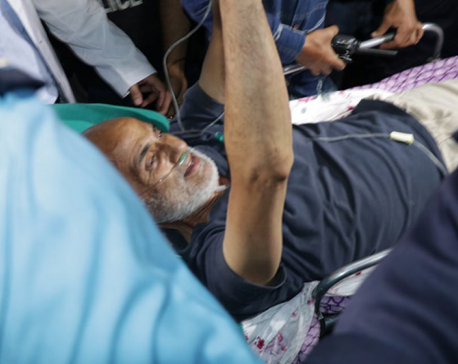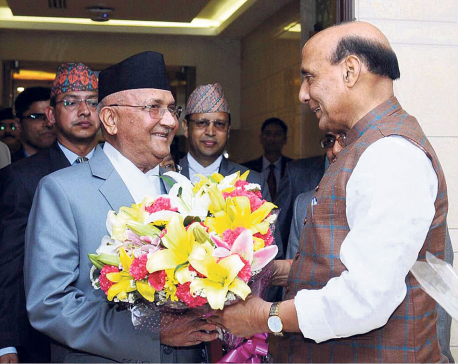
OR
People's War Day
Holeri incident, the turning point
Published On: February 14, 2018 01:36 AM NPT By: Prasanta Lamichhane | @prasantaparbat
KATHMANDU, Feb 13: The rebels had already fought the 'People's War' for six years. The country was reeling under deep conflict and restlessness. The government was under pressure to quash the rebellion, but it was getting more violent with the Maoists attacking government offices at one or the other places, basically in rural areas. The rebels were yet to face the army in the battleground. So, they did not know whether they could stand the challenge of the army.
At such a time, the Holeri incidence took place in Rolpa bringing the war entirely to a new level. As they came face to face with the army, both sides restrained from opening fire which eventually raised the confidence of the rebels. They thought that army could be fought against, too.
The Holeri incident is thus taken as a turning point in the history of Maoists insurgency.
The war analysts term the incident as a coincidence, rather than a planned event. On July 12, 2001 the rebels then known as CPN (Maoist) had announced 'Nepal Banda'. To make it successful, they had planned to attack some of the posts of the security forces.
Though they had decided to attack the camp of Armed Police Force in Bhaluwang of Dang after a careful study, the plot was exposed at the eleventh hour. The commanders were Nanda Kishor Pun, who is now the vice president of the country along with Barshaman Pun. They then selected Holeri of Rolpa for the execution of the plan. The rebels had attacked police posts in Ropla even in the initial days of the armed conflict. The government had then added security force in Rolpa.
But the rebels came to know that the police personnel would desert their camp at night in Holeri for fear of attack. This made them change the attack plan. The rebels then found out that the police would return to their camp early in the morning. Following this, the attack was planned for the morning.
When police reached their post in the morning, they were taken by surprise when the rebels warned them by loud speaker to surrender. The police refused to surrender at first and opened fire. After a few hours of crossfire, the rebels took 72 police personal under control. A policeman had even lost his life. Nanda Kishor Pun narrated this incidence in detail in his book 'Raktim Paila'.
To contain the rebel force, the government decided to deploy army. This was the rebels' first encounter with the army. Three army helicopters had reached Nuwagaun of Rolpa the next day of the Holeri attack.
One of the army helicopters made an emergency landing at Budhagaun of Rolpa after the rebels started attacking it.
At Nuwagaun, Maoists then sent a letter to the army. “We do not have any plan to attack you right now. Why have you come here? If you have come to start war with us, we will be forced to take up the challenge. We have cordoned you off, so you cannot get out from here.” This was the detail of the letter.
The army did not reply in the same format. Instead, its helicopter made rounds in the sky. That was considered an indirect reply by the army, Pun writes in the book.
Later, the army said that it was there for training and not for any kind of attack. Following this, the two sides sat for talks. And it was agreed that the army would be given way out and it would leave peacefully.
The 'failure' of the army was rejoiced by the rebels. This incident boosted self confidence, triggering historic changes in the political scenario.
You May Like This

Govt, Dr KC finally agree on disputed point, seal 22-point deal
KATHMANDU, July 26: The government and Dr Govinda KC have agreed on the disputed points that had halted on the... Read More...

Turning point
Both Modi and Oli enjoy great support from parliament and people for economic, social and cultural development ... Read More...

A Turning Point
My story began like most of the teenagers nowadays. A message popped up in one of the social networking sites.... Read More...





Just In
- MoHP cautions docs working in govt hospitals not to work in private ones
- Over 400,000 tourists visited Mustang by road last year
- 19 hydropower projects to be showcased at investment summit
- Global oil and gold prices surge as Israel retaliates against Iran
- Sajha Yatayat cancels CEO appointment process for lack of candidates
- Govt padlocks Nepal Scouts’ property illegally occupied by NC lawmaker Deepak Khadka
- FWEAN meets with President Paudel to solicit support for women entrepreneurship
- Koshi provincial assembly passes resolution motion calling for special session by majority votes






_20220508065243.jpg)






Leave A Comment